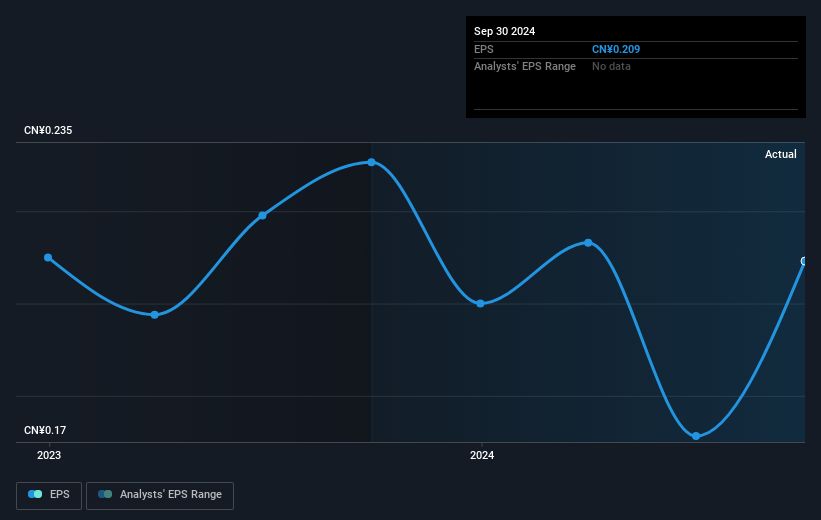- China
- /
- Electrical
- /
- SHSE:603618
Hangzhou Cable's (SHSE:603618) five-year earnings growth trails the 3.7% YoY shareholder returns

Stock pickers are generally looking for stocks that will outperform the broader market. And while active stock picking involves risks (and requires diversification) it can also provide excess returns. To wit, the Hangzhou Cable share price has climbed 13% in five years, easily topping the market return of 6.1% (ignoring dividends). On the other hand, the more recent gains haven't been so impressive, with shareholders gaining just 5.1%, including dividends.
The past week has proven to be lucrative for Hangzhou Cable investors, so let's see if fundamentals drove the company's five-year performance.
Check out our latest analysis for Hangzhou Cable
To quote Buffett, 'Ships will sail around the world but the Flat Earth Society will flourish. There will continue to be wide discrepancies between price and value in the marketplace...' By comparing earnings per share (EPS) and share price changes over time, we can get a feel for how investor attitudes to a company have morphed over time.
During five years of share price growth, Hangzhou Cable achieved compound earnings per share (EPS) growth of 1.7% per year. This EPS growth is lower than the 3% average annual increase in the share price. So it's fair to assume the market has a higher opinion of the business than it did five years ago. That's not necessarily surprising considering the five-year track record of earnings growth.
The company's earnings per share (over time) is depicted in the image below (click to see the exact numbers).

Before buying or selling a stock, we always recommend a close examination of historic growth trends, available here.
What About Dividends?
It is important to consider the total shareholder return, as well as the share price return, for any given stock. Whereas the share price return only reflects the change in the share price, the TSR includes the value of dividends (assuming they were reinvested) and the benefit of any discounted capital raising or spin-off. So for companies that pay a generous dividend, the TSR is often a lot higher than the share price return. We note that for Hangzhou Cable the TSR over the last 5 years was 20%, which is better than the share price return mentioned above. The dividends paid by the company have thusly boosted the total shareholder return.
A Different Perspective
Hangzhou Cable shareholders are up 5.1% for the year (even including dividends). But that was short of the market average. The silver lining is that the gain was actually better than the average annual return of 4% per year over five year. This could indicate that the company is winning over new investors, as it pursues its strategy. While it is well worth considering the different impacts that market conditions can have on the share price, there are other factors that are even more important. Even so, be aware that Hangzhou Cable is showing 2 warning signs in our investment analysis , and 1 of those is significant...
Of course Hangzhou Cable may not be the best stock to buy. So you may wish to see this free collection of growth stocks.
Please note, the market returns quoted in this article reflect the market weighted average returns of stocks that currently trade on Chinese exchanges.
If you're looking to trade Hangzhou Cable, open an account with the lowest-cost platform trusted by professionals, Interactive Brokers.
With clients in over 200 countries and territories, and access to 160 markets, IBKR lets you trade stocks, options, futures, forex, bonds and funds from a single integrated account.
Enjoy no hidden fees, no account minimums, and FX conversion rates as low as 0.03%, far better than what most brokers offer.
Sponsored ContentValuation is complex, but we're here to simplify it.
Discover if Hangzhou Cable might be undervalued or overvalued with our detailed analysis, featuring fair value estimates, potential risks, dividends, insider trades, and its financial condition.
Access Free AnalysisHave feedback on this article? Concerned about the content? Get in touch with us directly. Alternatively, email editorial-team (at) simplywallst.com.
This article by Simply Wall St is general in nature. We provide commentary based on historical data and analyst forecasts only using an unbiased methodology and our articles are not intended to be financial advice. It does not constitute a recommendation to buy or sell any stock, and does not take account of your objectives, or your financial situation. We aim to bring you long-term focused analysis driven by fundamental data. Note that our analysis may not factor in the latest price-sensitive company announcements or qualitative material. Simply Wall St has no position in any stocks mentioned.
About SHSE:603618
Hangzhou Cable
Engages in the research, design, development, manufacture, and sale of wires, cables, and optical fiber cables in China and internationally.
Acceptable track record with mediocre balance sheet.
Market Insights
Community Narratives


